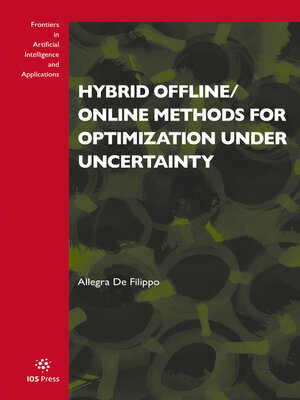Hybrid Offline/Online Methods for Optimization Under Uncertainty
ebook ∣ Frontiers in Artificial Intelligence and Applications
By Allegra De Filippo

Sign up to save your library
With an OverDrive account, you can save your favorite libraries for at-a-glance information about availability. Find out more about OverDrive accounts.
Find this title in Libby, the library reading app by OverDrive.



Search for a digital library with this title
Title found at these libraries:
| Library Name | Distance |
|---|---|
| Loading... |
Balancing the solution-quality/time trade-off and optimizing problems which feature offline and online phases can deliver significant improvements in efficiency and budget control. Offline/online integration yields benefits by achieving high quality solutions while reducing online computation time. This book considers multi-stage optimization problems under uncertainty and proposes various methods that have broad applicability. Due to the complexity of the task, the most popular approaches depend on the temporal granularity of the decisions to be made and are, in general, sampling-based methods and heuristics. Long-term strategic decisions that may have a major impact are typically solved using these more accurate, but expensive, sampling-based approaches. Short-term operational decisions often need to be made over multiple steps within a short time frame and are commonly addressed via polynomial-time heuristics, with the more advanced sampling-based methods only being applicable if their computational cost can be carefully managed. Despite being strongly interconnected, these 2 phases are typically solved in isolation. In the first part of the book, general methods based on a tighter integration between the two phases are proposed and their applicability explored, and these may lead to significant improvements. The second part of the book focuses on how to manage the cost/quality trade-off of online stochastic anticipatory algorithms, taking advantage of some offline information. All the methods proposed here provide multiple options to balance the quality/time trade-off in optimization problems that involve offline and online phases, and are suitable for a variety of practical application scenarios.







